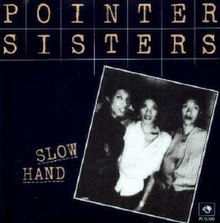Slow Hand
| "Slow Hand" | ||||
|---|---|---|---|---|
 |
||||
| Single by The Pointer Sisters | ||||
| from the album Black & White | ||||
| B-side | "Holdin' Out for Love" | |||
| Released | May 1981 | |||
| Format | 7" | |||
| Genre | R&B, pop, soul | |||
| Length | 3:57 | |||
| Label | Planet | |||
| Writer(s) | Michael Clark, John Bettis | |||
| Producer(s) | Richard Perry | |||
| The Pointer Sisters singles chronology | ||||
|
||||
| "Slow Hand" | ||||
|---|---|---|---|---|
| Single by Conway Twitty | ||||
| from the album Southern Comfort | ||||
| B-side | "When Love Was Something Else" | |||
| Released | April 24, 1982 | |||
| Genre | Country | |||
| Length | 2:56 | |||
| Label | Elektra | |||
| Writer(s) | Michael Clark, John Bettis | |||
| Producer(s) | Jimmy Bowen, Conway Twitty | |||
| Conway Twitty singles chronology | ||||
|
||||
"Slow Hand" is a ballad written by John Bettis and Michael Clark and recorded by The Pointer Sisters. It was first released in the spring of 1981 as the advance single for Black & White.
Although its sultry style recalls the Pointer Sisters' first top ten hit, the 1978 number 2 hit "Fire", "Slow Hand" was not written for the group; in fact John Bettis would state "the Pointer Sisters were the furthest [act] from [the composers'] minds." Like "Fire"—which also featured Anita Pointer on lead—"Slow Hand" peaked at number 2 on the Billboard Hot 100 for 3 weeks, behind "Endless Love" by Diana Ross and Lionel Richie. "Slow Hand" reached that position in August 1981 when it also reached number 7 on the R&B chart.
"Slow Hand" also afforded the Pointer Sisters international success, including the first appearance by the group in the UK top 10.
The track was ranked in the top 25 best singles of the year by The Village Voice Pazz & Jop poll.
"Slow Hand" was not the first song recorded by the sisters to have a country feel. In 1974 the group wrote and recorded the breakthrough track "Fairytale".
The song was covered in 1981 by country singer Del Reeves, whose version peaked at #53 on the Hot Country Singles chart.
The song was covered in April 1982 by country singer Conway Twitty with minor lyric changes to accommodate a heterosexual male singer. His version, on Elektra Records, topped the Billboard Hot Country Singles chart for two weeks that June, and was his last multi-week number-one song.
...
Wikipedia
